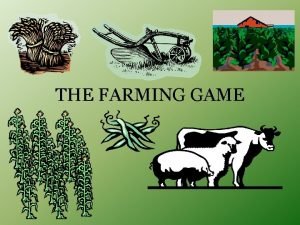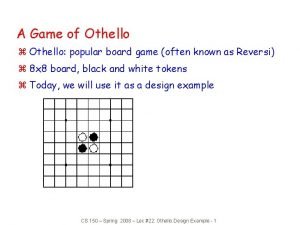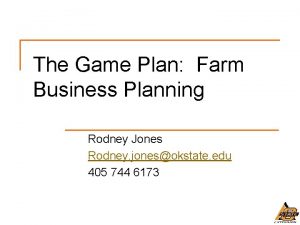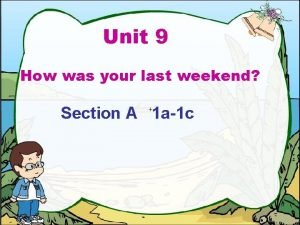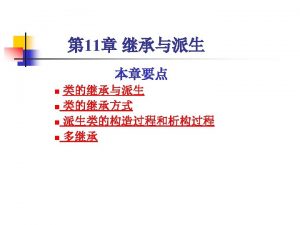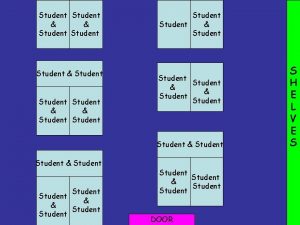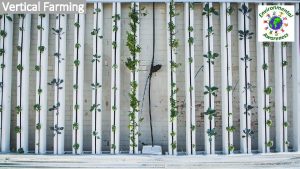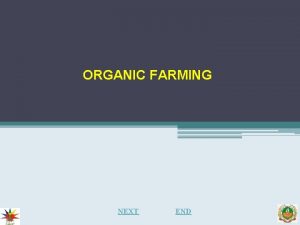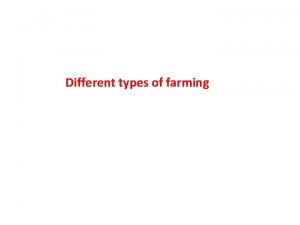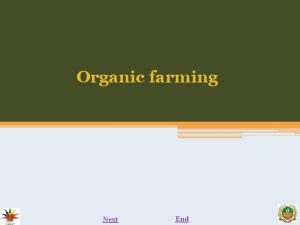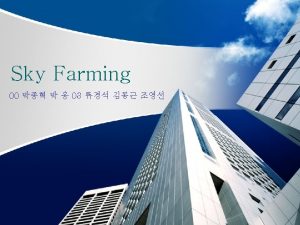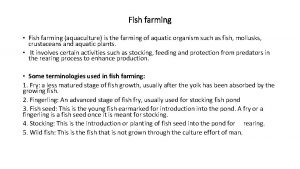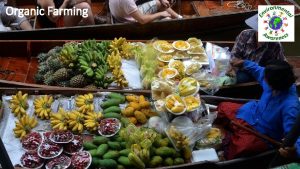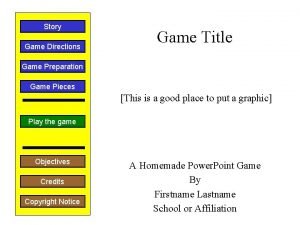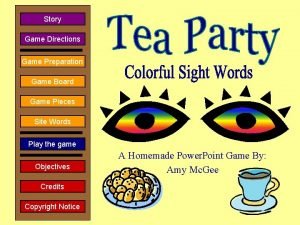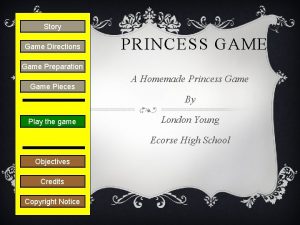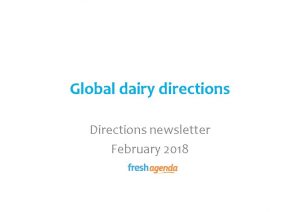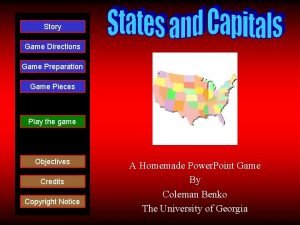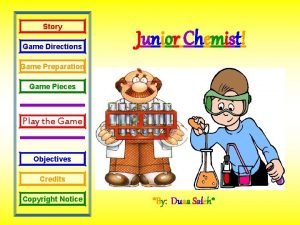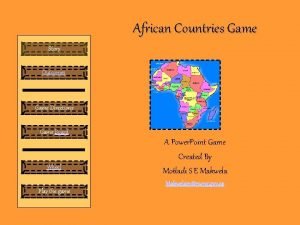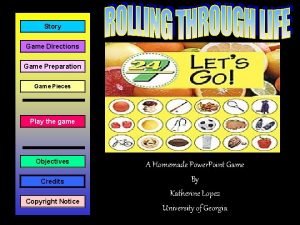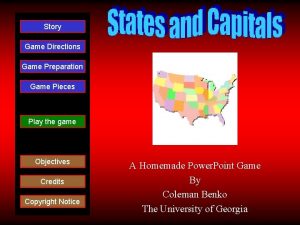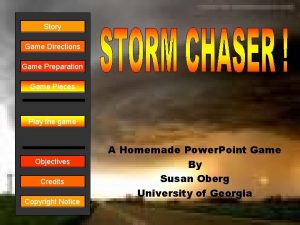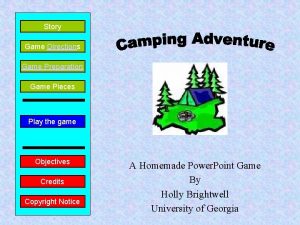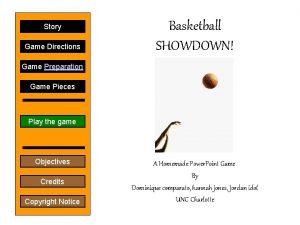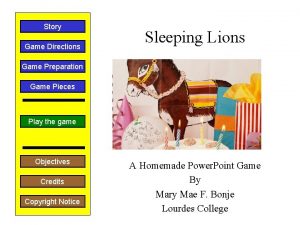THE FARMING GAME Farming Game Instructions Student Directions































- Slides: 31

THE FARMING GAME

Farming Game Instructions • Student Directions: You are to assume the role of a farm family who has just homesteaded land in central Nebraska. You have just selected a 160 acre farm along the Platte River, which you will farm for three years -- 1885, 1886, and 1887. You have purchased all the necessary farm equipment and you have come west on the Union Pacific Railroad. Your homestead is one of the first in this area. You selected it because you may graze your livestock on public land at no cost. But you can only plant up to 3 different crops in one year. • In addition to your equipment, you have $1500 to start your farm. You must not invest $300 which you will need to live on, and $200 which you must have at the end of the year to ship your crops.

• As you begin the game, you have $1000 to invest in crops or livestock. Listed on the scoring sheet is the cost-per-acre for each crop. You may also spend some of your money for livestock. The scoring sheet lists the price per animal. Animals may be grazed on public land at no cost. All costs, such as seed, labor, supplies, taxes, and maintenance are included in your cost per acre, or per animal

• To begin the game, look at the sheet entitled "Farming Game 1885 -1887. " On the line at, the top fill in $ 1000 as your capital and the year 1885. Then, select which crop, or crops, you wish to plant. For example: if you plant 160 acres of corn and use all your land, the cost will be 160 x $5 = $800. You will have $200 left to invest in livestock. If you select cattle and spend your remaining $200, you may purchase 20 cows (20 cows x $10 each = $200).

• Figuring your Profits: When everyone in the class has spent their capital, the teacher will read/post the rate of investment returns (the amount you will multiply times the amount you invested in a crop). For example: if you spent $200 on cattle and the 1885 investment return for cattle was 1, you would multiply $200 x 1 = $200 = zero profit.

• When you have calculated your profit or loss on each investment, total them. This becomes your capital for the year 1886. In the earlier example, the total profit made for 1885 for raising corn and cattle (corn $1600 and cattle $200) was $1800. Using the amount on your Total Profits line for 1885, allocate your money for the year 1886. Be sure to subtract the $500 needed for living expenses and -shipping costs. Do the same for 1887.

• Lets do the Practice Sheet together!! • Step 1: Fill in $1, 000 to your Capital for the year 1885 – Remember it is only $1, 000 b/c $300 goes for cost of living & $200 for the transportation of your goods

• Step 2: Now lets decide what we are going to buy – Remember we can only plant 160 acres and each crop comes in 10 acre units and we can only plant up to three crops – Lets go with 100 acres of Corn & 60 acres of Barley – Remember to draw your crops on your plot of land

• Step 3: Figure out how much money you have spent on crops (to decide if you want to spend any on livestock) – 100 acres of Corn at $5 an acre = ? • $500 – 60 acres of Barley at $2 an acre = ? • $120 – How much money have we spent of our $1000? • $620 • Leaving $380 for livestock

• Step 4: Do you want to buy any livestock with the left over money? Or save the money for the next year? – If you want to buy livestock this is what you do: • buy 38 cattle at $10 per animal (using all of you $380) – If you don’t want to buy livestock you place your left over money on the savings line

• Step 5: Calculate the total amount of money you have spent for the year – Total Cost of Crop + Total Cost of Animals + Cost of Living + Cost of Transportation + Savings = Total – That whole column should total to $1500 • Your Total for the year should be $500 more than your Capital at the beginning of the year

• Step 6: Fill in the Investment Return Column – I will give you the investment returns for each crop and livestock and you will fill them in

Investment Returns for 1885 – Corn – 1 – Beans – 2 – Wheat – 3 – Barley – 1 – Oats -. 5 – Field Hay – 7 – Tobacco -. 3 – Field Peas – 2 – Cattle – 1 – Sheep – 2 – Hogs – 1 • Fill these numbers into the Investment Return column for 1885

• Step 7: Figure out your profits for each crop and the year – Multiply your total cost of crop and your investment return to get your total • $500 x 1 = $500 • $120 x 1 = $120 • $380 x 1 = $380 – Next add your Profits Column to get your total profits for the year • $500 + $120 + $380 = $1000 • This is how much money you have to start your next year • Remember that when you start your next year you need to subtract your cost of living & transportation ($500) from your total profits • SO you are actually starting the year with $500 (that is what you will put on the Capital line for the year 1886)

• ANY QUESTIONS? ? ? ? • NOW LETS START & MAKE SOME $$$$$

1885 • Fill in your Capital and decide what you want to put your money into. – Remember you start with $1500, but really you put $1000 on your Capital line b/c you have to subtract your cost of living & transportation costs – You need to fill out the Number of Acres Planted/Number of Animals column – You need to fill out the Total Cost of Crop/Total Cost of Animals column • This column should add up to what you started the year with ($1500)

1885… • A serious lack of early spring rain in May almost destroyed the wheat, barley, and oat crop in central Nebraska. The prices paid for corn, beans, field peas, and tobacco are up because of drought east of the Mississippi. Cattle prices are depressed because of large herds of range stock being sold in Texas. The price for sheep is up and the price paid for hogs is at an all-time high.

1885 Investment Returns • • Corn – 2 Beans – 3 Wheat – 1 Barley – 1 Oats – 1 Field Hay – 2 Tobacco – 2 Field Peas – 2 • Cattle – 1 • Sheep – 2 • Hogs – 3 – Fill these into the Investment Return Column

1885 • Now figure out your profits!! – Remember to multiply your Total Cost of Crop/Total Cost of Animals column and the Investment Return Column. – Fill in your Profits Column and then add all your Profits together • If you had any money in savings remember to add that into your profits too – Any Questions? – Make sure you have done EVERYTHING correctly before we move onto the next year!!!

1886 • Fill in your Capital and decide what you want to put your money into. – Remember you start with $500 less than your profits from 1885 b/c you have to subtract your cost of living & transportation costs – You need to fill out the Number of Acres Planted/Number of Animals column – You need to multiply your Number of Acres/Number of Animals column by the Cost per Acre/Cost per Animal column to figure out the Total Cost of Crop/Total Cost of Animals column – Your Total Amount Spent for the year should equal your profit from the previous year (double check your work!!!!)

1886… • The coldest winter in history with temperatures 60 degrees below zero destroyed most of the cattle and hogs. Sheep prices are high. Abundant spring and summer rain throughout most of the state has produced excellent crops. The price of corn, wheat, barley, and oats is good and the price of tobacco and field peas remains the same. The bean crop has produced a small yield because of late frost and the field hay prices are depressed because of limited demand for hay.

1886 Investment Returns • • Corn – 1. 5 Beans – 1. 5 Wheat – 2 Barley – 1. 5 Oats – 1 Field Hay – 2 Tobacco – 1 Field Peas – 1 • Cattle – 0 • Sheep – 3 • Hogs – 0 – Fill these into the Investment Return Column

1886 • Now figure out your profits!! – Remember to multiply your Total Cost of Crop/Total Cost of Animals column and the Investment Return Column. – Fill in your Profits Column and then add all your Profits together • If you had any money in savings remember to add that into your profits too – Any Questions? – Make sure you have done EVERYTHING correctly before we move onto the next year!!!

1887 • Fill in your Capital and decide what you want to put your money into. – Remember you start with $500 less than your profits from 1885 b/c you have to subtract your cost of living & transportation costs – You need to fill out the Number of Acres Planted/Number of Animals column – You need to multiply your Number of Acres/Number of Animals column by the Cost per Acre/Cost per Animal column to figure out the Total Cost of Crop/Total Cost of Animals column – Your Total Amount Spent for the year should equal your profit from the previous year (double check your work!!!!)

1887… • Nature deals a crushing blow to farmers in Nebraska. After a hot, dry spring with little rain, a plague of grasshoppers infested the crops. Most crops are badly damaged. Cattle prices are very good, as the range herds have not yet recovered from the killing winter of 86. Sheep prices are depressed but hog prices are very good.

1887 Investment Returns • • Corn -. 5 Beans -. 5 Wheat – 0 Barley – 1 Oats – 1 Field Hay -. 5 Tobacco – 0 Field Peas – 1 • Cattle – 1. 5 • Sheep -. 5 • Hogs – 2 – Fill these into the Investment Return Column

1887 • Now figure out your profits!! – Remember to multiply your Total Cost of Crop/Total Cost of Animals column and the Investment Return Column. – Fill in your Profits Column and then add all your Profits together • If you had any money in savings remember to add that into your profits too – Any Questions? – Make sure you have done EVERYTHING correctly before we move onto the next year!!!

1888 (the last year) • Fill in your Capital and decide what you want to put your money into. – Remember you start with $500 less than your profits from 1885 b/c you have to subtract your cost of living & transportation costs – You need to fill out the Number of Acres Planted/Number of Animals column – You need to multiply your Number of Acres/Number of Animals column by the Cost per Acre/Cost per Animal column to figure out the Total Cost of Crop/Total Cost of Animals column – Your Total Amount Spent for the year should equal your profit from the previous year (double check your work!!!!)

1888… • The unpredictable Platte River floods the farm land as unusually large snowfall in the Mountains melt. Only field peas, planted late have a decent return. Cattle, being stupid, drown themselves trying to feed. Sheep prices are up and hog prices drop.

1888 Investment Returns • • Corn – 1 Beans – 1 Wheat – 1 Barley – 1. 5 Oats – 1. 5 Field Hay – 1 Tobacco -. 5 Field Peas – 3 • Cattle -. 5 • Sheep – 2. 5 • Hogs – 1 – Fill these into the Investment Return Column

1888 • Now figure out your profits!! – Remember to multiply your Total Cost of Crop/Total Cost of Animals column and the Investment Return Column. – Fill in your Profits Column and then add all your Profits together • If you had any money in savings remember to add that into your profits too – Any Questions? • Who made the most money? ? ? ? ?
 The farming game board game
The farming game board game Directions for operation game
Directions for operation game Stage directions game
Stage directions game Othello game directions
Othello game directions Rodney jones basketball
Rodney jones basketball Sustainability farming game
Sustainability farming game How's your last weekend
How's your last weekend We ...... a big piece of wood last saturday. (see)
We ...... a big piece of wood last saturday. (see) National student clearinghouse student tracker
National student clearinghouse student tracker Class maths student student1 class student string name
Class maths student student1 class student string name National student clearinghouse student tracker
National student clearinghouse student tracker Freckle com math
Freckle com math Good morning class how are you today
Good morning class how are you today Student learning space login page
Student learning space login page Hát kết hợp bộ gõ cơ thể
Hát kết hợp bộ gõ cơ thể Frameset trong html5
Frameset trong html5 Bổ thể
Bổ thể Tỉ lệ cơ thể trẻ em
Tỉ lệ cơ thể trẻ em Voi kéo gỗ như thế nào
Voi kéo gỗ như thế nào Tư thế worm breton
Tư thế worm breton Chúa sống lại
Chúa sống lại Môn thể thao bắt đầu bằng chữ đua
Môn thể thao bắt đầu bằng chữ đua Thế nào là hệ số cao nhất
Thế nào là hệ số cao nhất Các châu lục và đại dương trên thế giới
Các châu lục và đại dương trên thế giới Công thức tiính động năng
Công thức tiính động năng Trời xanh đây là của chúng ta thể thơ
Trời xanh đây là của chúng ta thể thơ Mật thư tọa độ 5x5
Mật thư tọa độ 5x5 Phép trừ bù
Phép trừ bù độ dài liên kết
độ dài liên kết Các châu lục và đại dương trên thế giới
Các châu lục và đại dương trên thế giới Thể thơ truyền thống
Thể thơ truyền thống Quá trình desamine hóa có thể tạo ra
Quá trình desamine hóa có thể tạo ra
